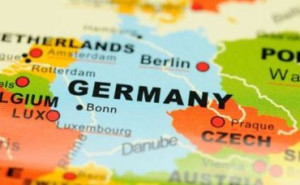Germany bogged down in refugee politics
 The Germans have a term – “Fluchtlingspolitik” – which means ‘refugee politics’ and it is an arena that makes for uncomfortable debate in the federal republic.
The Germans have a term – “Fluchtlingspolitik” – which means ‘refugee politics’ and it is an arena that makes for uncomfortable debate in the federal republic.
As Germany’s reception of refugees and asylum seekers soars so are incidents of racism, according to recent news reports.
In the first half of this year, around 180,000 people claimed asylum in Germany but that number is expected to reach around 800,000 by the end of 2015.
As more refugees arrive attacks on accommodation for asylum seekers have increased significantly. According to interior ministry data, this year there have already been 173 attacks – 175 were registered in the whole of last year.
Recently more than 2000 people marched through Dresden in support of ‘Pedgida’ a movement against what it called the “Islamisation of the West”, which attracts the far right as well as people who simply oppose immigration or fear its effects.
And, nearby, in the town of Freital, several hundred people held anti-refugee protests outside accommodation for asylum seekers.
The attacks and protests horrify most Germans. Many believe it is the duty of a rich country to help refugees.
Others view immigration as a potential solution to the country’s ageing demographic and a shortage of skilled labour.
Above all, in a country where the past still stains the present, any manifestation of racist sentiment evokes profound concern.
Justice Minister Heiko Maas last week condemned the protests, saying there was “no place for xenophobia in Germany”.
The news magazine Spiegel pictured refugees on a recent cover, with the banner headline: “Hatred of asylum seekers poisons Germany”.
And there is an unedifying among politicians as to over how to deal with the issue.
The debate – which has been simmering for months – can be boiled down to two basic questions: Who should pay for the refugees flooding into Germany?
And, is there a way to reduce the numbers?
The federal government recently agreed to give the states extra cash to cope with the growing bill. But almost all say it is not enough.
Some political groups have put together controversial plans to reduce the number of asylum seekers from Albania, Kosovo and Montenegro.
The proposal would extend a strategy the federal government executed last year.
In December, Berlin declared Serbia, Bosnia-Hercegovina and Macedonia “safe countries of origin”, making it much easier and quicker for the state to refuse asylum claimants from those countries.
The initiative saw the number of asylum seekers from those countries has risen by 12 per cent, while the numbers from Albania, Kosovo and Montenegro rose by 500 per cent.
While this year 34,000 refugees have arrived from Syria, 31,000 came from Kosovo and many politicians want to, declaring it and the two other Balkan states “safe”.
But gaining consensus on that proposal may be tricky.
There is opposition from those who believe it is morally wrong and impractical, and who worry such a plan is simply borne out of – and promotes – right-wing anti-immigrant rhetoric.
Asylum applications from outside the EU in 2014:
- EU total: 625,920
- Germany: 202,645
- Sweden: 81,180
- Italy: 64,625
- France: 64,310
- Hungary: 42,775
- UK: 31,745
Cesira Colleluori
AMES Australia Staff Writer












